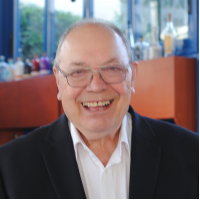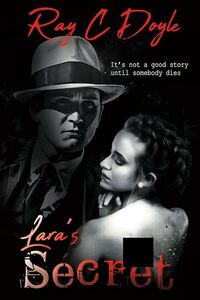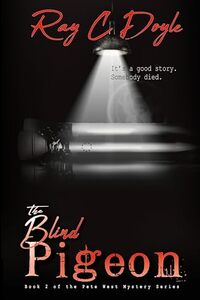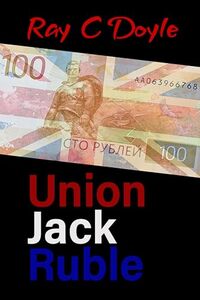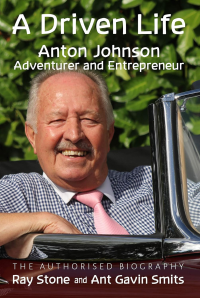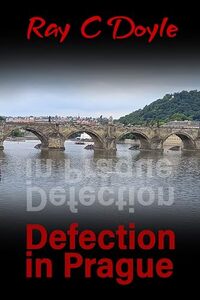Ray C Doyle Interview Published on: 28, Aug 2024
 You started winning writing competitions at a very young age. What sparked your interest in writing, and how has that evolved over the years?
You started winning writing competitions at a very young age. What sparked your interest in writing, and how has that evolved over the years?
One starts with a desire to write and inspiration to create but both need a start button. My father insisted that if I mastered the basics of reading, writing, and arithmetic, I would be able to achieve anything in life. As a kid, he would ask me to read small sections of his newspaper each night. I graduated on my tenth birthday when he gave me a book. It turned out to be my start button. I was fascinated by the language and descriptive narrative and became engrossed as my father explained certain points in the plot and offered his thoughts and opinions about the author. I was hooked, although in places, the book was a little hard for me to understand. The book was Great Expectations by Charles Dickens.
I took my father’s advice and concentrated on achieving good results in English, English Literature, and mathematics during my school years. I did not like school but won first prize for a short story at eleven. I am sure that reading from an early age not only filled me with a desire to write but filled my head with adventurous plots.
Since leaving school just before my fifteenth birthday, I never stopped writing. I think my move into poetry at eighteen was the key to a permanent love of writing. I found that in poetry I could really express myself freely. This gave me confidence to use my characters in fiction, sometimes to express my own views and emotions, whether sad, angry, or happy. As a result, I have never been afraid to explore the mindset of my characters. This helped create my own style and self-confidence.
You've worked with a wide array of artists and orchestras in theatre. How has your experience as a technician influenced your writing?Working backstage on concerts and stage entertainment became a great goldmine for me. As a sound engineer, I spent several years that had a lasting effect on the way I developed my fictional characters and emotional moments that sparked feelings for my poetry and musical lyrics. The entertainment and arts industry attracts a big community of talented larger-than-life artists, each with a story to tell that I was more than willing to listen to. One sees both sides of an artist; one that the audience love and the other sometimes sad or rough or downright rude and offensive. I loved them all, as they smiled, argued, or spent hours looking for work on The Stage. The majority lived from one week to another and the atmosphere their lives created around me left their habits, language, and nuances in my memory.
Tell us about your transition from writing poetry and lyrics to working on your first novel. What was that experience like?My first book never got published but came about because of poetry. I wrote ANGRY SILENCE that later won an award. I decided to write some verse on the same theme about a nightclub I worked at part-time. It was sarcastic and comical but a serious reminder that drugs were fast becoming part of the younger generations’ lives. After experiencing several incidents involving teenagers, I began to write a blog about the club that eventually turned into a book. I thought it too violent, and it now gathers dust, but the exercise sparked a desire to write seriously.
I also wrote lyrics and moved to composing blues numbers that seemed to match my mood at the time. A year later I finished writing THE TROJAN TOWERS, a crime thriller that fired me up, and to this day, I continue to write poetry and thrillers. I think the transition from poetry to writing a novel came through a sense of wanting to voice something that bothered me, and I found it easy to share opinions through poetry and my characters.
'Angry Silence' won first place in an international poetry competition. Can you share the inspiration behind that poem?I was in London to see a show and as I walked back to the rail station, I passed other concertgoers dressed for the occasion. I also passed small groups of meths drinkers and homeless in a small park. As I travelled home, I became angry at the social divide and lack of aid for those in need. At home, I could not sleep and wrote the poem in less than thirty minutes. Anger ripped through my pen. I was amazed when sometime later, I read the work and found it hard to believe I was the author. Since then, I have written several poems about conservation and human rights.
Moving to Colchester seemed to have been a significant point in your career. How did the locale influence your writing?Colchester is an historic town with its roots in the Roman era. The castle and museum are filled with artifacts from the 16th, 17th, and 18th centuries. Daniel Defoe lived there when writing Robinson Crusoe. Among the trees that used to be part of a forest and hunting land for royalty, lead balls can be found embedded, reminders of the Civil War. It was at this point in my career that I began to write my first thriller. I found it easy to write, surrounded by so much history and all the adventurous stories attached to it. It was the start of a long learning curve that became, and still is, a bumpy journey.
Your first novel—can you tell us about the story and what inspired you to write it?Inspiration is a strange thing and comes in many guises. Most of my books are inspired by news headlines, but others have a strange or funny birth such as my first, The Trojan Towers. One Sunday morning, I was up late. I had been trying to think of a great crime story involving a daring robbery and maybe a kidnapping. I had a rough idea but that was all. I made a mug of coffee and, as I sat on the sofa, I sat on the TV remote. Rising quickly, I spilled the coffee and made quite a mess. The TV had come on and as I saw the screen, I had my plot. A sudden flash of real inspiration. What I watched was the Lord Mayors procession in London and it was passing close to Hatton Garden that became a focal point in the story. The plot started out as a simple crime caper and ended up more complicated, something I have not managed to cure myself of in all the books I have written. This is basically the plot.
Harry Cohen, London desk for Mossad, must retrieve a priceless icon, crucial to the success of a secret Middle Eastern peace deal brokered by America and the Russians, that's been stolen by a ruthless mercenary. Harry knows who can steal it back. A convict, whose daughter, Natalie, he mentored. Raithe Ravelle, a professional thief released on appeal and with a score to settle, reluctantly agrees to help Natalie's benefactor. Both men embark on a daring robbery but are soon thrown into a race against time as Natalie is kidnapped. They must find a way to stop a Middle East crisis and rescue Natalie. In a roller coaster ride through London, Zurich, Amsterdam, and finally to deserted wartime forts in the River Thames, they are involved in a life-and-death struggle to reach the frightened teenager -and the treasure in THE TROJAN TOWERS.
Collaborating with a local composer to produce blues numbers sounds intriguing. How did that collaboration come about, and how does writing lyrics differ from writing novels?Writing lyrics and novels to me is the same thing. Both art forms tell a story that involve anger, passion, love, and forgiveness. I was looking through, I believe, The Stage or Melody Maker, and came across a small ad from a composer who was looking for a lyricist. We got together and hit it off. His music was mainly composed electronically. During the couple of years we were working on various projects, we produced three demo discs, all Blues numbers that unfortunately failed to make it to the radio. Another lesson here on the bumpy learning curve that despite writing something superb, only you seem to know that. I have many lyrics written and stored, just in case I make it big. The transition to writing a book was for me a non-event. I think my love for writing in general overcame any difficulties. I really believe that love and ability to compose verse is a great plus when writing a novel. There is a rhythm and sense of passion in poetry that I found easy to transfer when writing a novel, particularly in descriptive elements. I can feel the workflow that creates the desired atmosphere.
You've written across various genres and mediums. Do you have a favorite form or genre?My favourite genres are political/crime thrillers, but I love short stories and biographies. I ventured into many genres except love stories. My best example of genre work is my book LITTLE GEMS. A collection of short stories, each a different genre, including a young adult’s story.
Who are some of your literary influences, and how have they shaped your writing style?Charles Dickens became and still is one of two authors who dominated my life. Raymond Chandler is the other. It is perhaps, a strange choice of inspirational heroes, considering their many differences in style, language, and genre. Dickens wrote about Victorian social life and injustice through great descriptive narrative, and sometimes a moral message for readers through actions and speech of his characters.
Raymond Chandler, in a noir style, had a unique way of describing the American layers of social life and the rough and ready justice system. His first-person language became a template for many future crime and mystery writers. Dickens and Chandler will continue to influence my writing in whatever genre I am working in.
How do you approach the writing process? Do you have any rituals or habits that help you write consistently?I developed a ritual I follow every time I sit down to write. I start by reading the previous day’s work to check the plot, the characters involved, and many other points, whether small or important. I then start to write to continue the story. It might be descriptive or dialogue or action. After thirty minutes, I erase all work, the reason being that most of the ‘warm up’ period gets removed during an edit. I am not into the story and not in my character’s shoes enough and most times that shows. After this, I am “into” the plot. I sit back in my chair and close my eyes for a few seconds and picture the scene in my mind’s eye. It’s a street scene and my main character is walking in the East End of London. I can smell a bakery as I walk past and can hear two people having a row. A car shoots by and honks a horn. A number twelve bus stops to take on passengers and I can see how they are dressed and hear one of them cough as they throw a cigarette butt into the road. All this takes seconds, but it gets me into the mood, and within a couple of minutes, I am writing what I have just imagined. My other routine is researching the plot. Don’t read travel books and blogs. Go there and make notes. Sit in a busy shopping precinct and find your characters. Make a note of bus numbers and what trees are along the road. Everyone should have a routine that works for them. There is no such animal as writer’s block as far as I am concerned.
What do you hope readers take away from your novels and poetry?I like to think that readers learn something about me through my style of writing. I hope that, whilst enjoying my work, they see a picture of someone who is adventurous and not afraid to voice an opinion or, alternatively, someone who is passionate about freedom and justice for ‘Joe Public’.
Are there any particular themes or subjects that you find yourself drawn to in your writing?I love politics and politicians. My hero, Pete West, a political columnist in my political thrillers – The Pete West Mystery Series – is a hard-bitten man who loves exposing corruption and security issues in government. I love using his mind and soul as my own when he lets anger rip or shows emotion. I love composing verse about compassion, memories from yesteryear, and conservation concerning the planet. Most of my themes are drawn from today’s headlines.
What has been the most rewarding experience for you as an author so far?I think the most rewarding thing for me so far is that I have over twenty books published and can feel a sense of achievement when I see how my work has improved over the years.
What can we expect next from you? Any upcoming projects or works in progress that you can share with us?I have turned to something I have never tried before. I want to write a TV sitcom, something I can draw from my own life and hope I can find a home for it. Apart from that, another plot for Pete West is taking shape.
How long have you been associated with AllAuthor? How has your experience been?I have been with AllAuthor for about a year. This is a wonderful new tool for authors, and I was amazed when I first joined at the amount of marketing aid one can receive at such a small cost. I intend to put a few more books through AllAuthor. I have received many compliments from fellow writers about my posts using AllAuthor and all of them I have referred to this company. The best thing I have found is the great way one can meet fellow authors and become part of a community where we can write to each other and pass on help and opinions. All in all, it has been a great experience.
Share Ray C Doyle's interview
Ray Stone is a versatile author with a rich tapestry of creative experiences. Winning a writing competition at eleven sparked his passion for the arts, which blossomed during his teens. Balancing his literary pursuits with music, he collaborated on blues recordings before dedicating himself to writing full-time. Today, Ray continues to create, weaving his diverse experiences into his work.
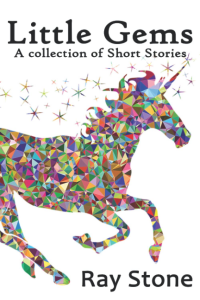 Little Gems: Short Stories
Genre: Historical Mystery, Thriller, Suspense, Mystery, Action & Adventure, Historical Fiction, Science Fiction
Little Gems: Short Stories
Genre: Historical Mystery, Thriller, Suspense, Mystery, Action & Adventure, Historical Fiction, Science Fiction
